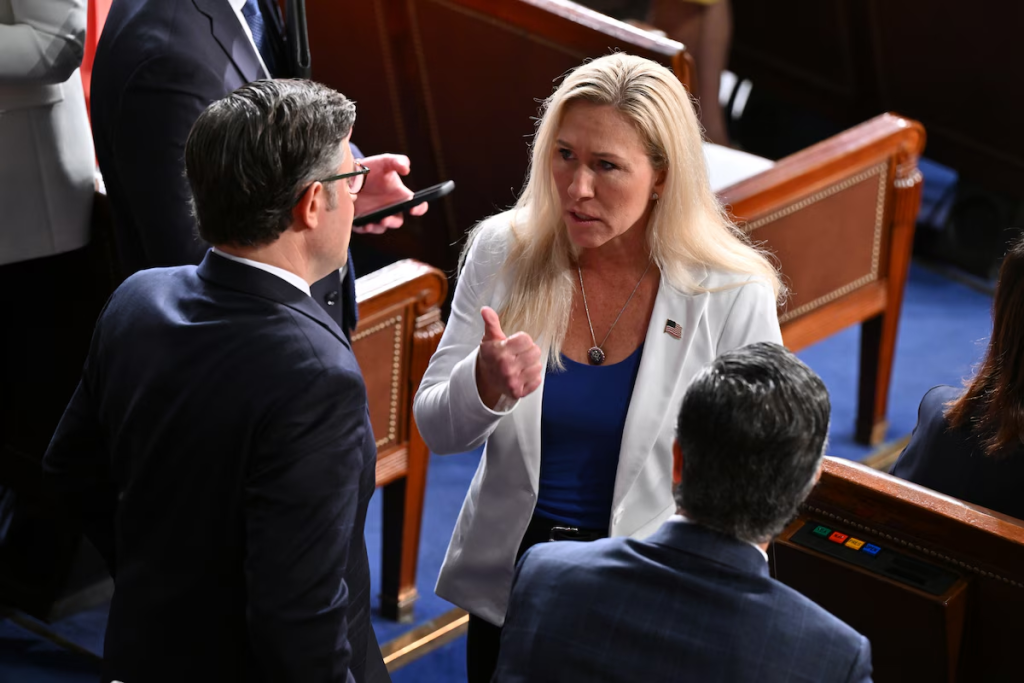U.S. House Speaker Mike Johnson unveiled a plan Monday evening to advance U.S. foreign aid in his chamber by proposing four separate bills, among which two would address the aid for Israel and Ukraine, respectively.

According to the plan, which Johnson announced after huddling with the House GOP conference in a closed-door meeting, four individual bills will be presented on the House floor and voted separately as soon as this week.
One bill will provide funding for Israel, another will fund Ukraine’s conflict with Russia, a third will support U.S. allies in the Indo-Pacific, and an unspecified fourth bill aims to “counter our adversaries and strengthen our national security,” Johnson said in a post on X.
The announcement marked the first concrete indication that the House speaker would try to find a path forward after resisting for months a Senate-passed 95-billion-U.S.-dollar bill. This bill approved a sweeping supplemental budget request from President Joe Biden’s administration, combining aid for Israel, Ukraine, and other allies.
“We won’t be voting on the Senate supplemental in its current form, but we will vote on each of these measures separately in four different pieces,” Johnson told reporters as he emerged from the meeting, adding that an amendment process will be allowed for the bills.
As far as timing is concerned, the Louisiana Republican said he expected the text of the bills to be finalized as soon as Tuesday. If that is the case, the floor vote could happen Friday at the earliest, Johnson said.
What was notably missed out in the four measures, though, was a policy overhaul to address what Republicans considered a crisis on the U.S. southern border. Resolving the broken immigration system was Johnson’s main reason for delaying a vote on the Senate-approved bill.
Such a move is nothing short of a gamble for Johnson, not only because it would be nearly impossible for the four bills to pass with a simple majority, given the historically slim majority Republicans now hold in the chamber, but also because it could potentially result in the speaker being ousted by a vote called for by GOP congresswoman Marjorie Taylor Greene of Georgia. She threatened to deprive Johnson of his speakership should he allow any more money for Ukraine.
Greene said on Monday that she had not decided on when to trigger the process to vacate the speaker’s seat. Nonetheless, she called Johnson’s plan a “scam” and “another wrong direction.”
“He’s definitely not going to be speaker next Congress,” Greene said, adding it was “to be determined” if he would even finish out this term.
Earlier in the day, the White House announced its opposition to a stand-alone bill from Republicans that provides aid only to Israel, doubling down on pressure for Johnson to pass the supplemental as it is.
“We are opposed to a stand-alone bill that would just work on Israel, as we’ve seen proposed. We would oppose a stand-alone bill, yes,” National Security Council spokesman John Kirby told reporters at the White House’s first briefing after Israel became the target of a large-scale retaliatory attack by Iran over the weekend.
“Time is not on anyone’s side here in either case,” Kirby said of Israel and Ukraine. “So (House Republicans) need to move quickly on this. And the best way to get that aid into the hands of the IDF (Israel Defense Forces) and into the hands of the Ukrainian soldiers is to pass that bipartisan bill that the Senate passed.”
Johnson told reporters that he and his GOP colleagues discussed at the end of the meeting whether to merge the four bills into a single package and send it to the Senate. While the decision is yet to be made, the speaker said his “personal preference is to do it individually.”